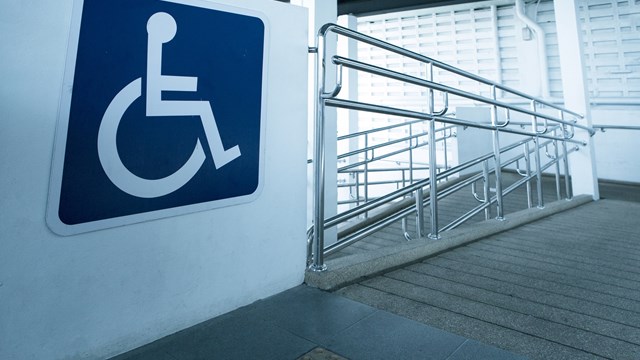
New Jersey and New York are famous (perhaps infamous) for their residents' philosophy of minding their own business—dress as a giant chicken, sport a revolutionary haircut…nobody minds. This attitude is great if you're a young person expressing your inner bohemian—but somewhat less great if you're an elderly person or someone with a mental or physical handicap, or a kid with working parents taking care of younger siblings. Who looks out for these folks when there is a fire, flood, power outage, hurricane or other emergency?
Of course we all want to look out for ourselves and our family, but building managers and boards should have a plan created in advance to manage any emergency situation and include the special needs of certain residents who may need additional assistance. Planning ahead gives you and your residents a better chance for survival in case of disaster.
To determine which residents need special assistance, solicit the entire building, not just select residents, but make sure to keep that information private.
"A person's physical disability or living situation cannot be part of whether or not to rent an apartment," says John A. Amorison, an attorney in Palisades Park, New Jersey.
"However, once that is not an issue as to the initial renting (or purchase), the property manager must develop an at-risk plan that balances the needs of these at-risk residents versus their right to privacy. The property manager may request, not demand, that such information be provided to assist the property manager and emergency personnel in case of an emergency. But, that any information that is provided is secure and not divulged to anyone else."
You can solicit your residents by sending a letter offering the opportunity for any resident to let management know what their special needs are. To prevent any legal troubles, management should confer with their building attorney to review or draft a letter and make certain the wording is correct.
The Disabled and the Elderly
Ask about communication difficulties, physical limitations, equipment instructions and medication procedures. Address their needs at each step of the planning process. Identify residents who are willing to help other special needs residents and be sure they are able to handle the job. This is particularly important if someone needs to be lifted or carried. Plan how you will alert people who cannot hear an alarm or may not understand instructions. Practice your plan to ensure employees with disabilities and their helpers know what is expected of them.
According to the United States Access Board, an independent federal agency whose primary mission is accessibility for people with disabilities, during the terrorist attacks on the World Trade Center, two men carried a woman who uses a wheelchair down 68 flights to safety moments before the tower collapsed. This and other stories have shed light on what hardships people with disabilities face in any crisis and the importance of taking into account the needs of all persons. Not only is getting out of their building a priority, but finding a safe haven afterward.
In October, Richard Canas, the state's homeland-security director, said at a hurricane-preparedness conference that the lack of a statewide plan for evacuating the disabled was a major gap in New Jersey's emergency plans. Canas plans on creating a central, statewide voluntary database of those who need special attention in an evacuation. But the problem, similar to what property managers have, is getting the names and locations of special-needs residents.
Disabled residents can already register with their county offices of emergency management, but there is no statewide master list and it cannot be forced—the disabled have to voluntarily submit personal information. If the disabled person is electric-dependent they should also register with their utility company. Make sure they, along with your Office of Emergency Management and Police, keep a record of the special assistance needed during a power outage.
According to the American Disabilities Act Guide for Local Governments, management should involve people with disabilities in identifying their needs and evaluating effective emergency management practices. Issues that have the greatest impact on people with disabilities include notification; evacuation; emergency transportation; sheltering; access to medications, refrigeration, and back-up power; access to their mobility devices or service animals while in transit or at shelters; and access to information.
Once their input has been included in an evacuation/emergency plan, it's important to determine how they will be evacuated if they have special needs including wheelchairs, scooters, walkers, canes or crutches, or people who have limited stamina. Plans also need to include people who use oxygen or respirators, who are blind, those who are deaf or hard of hearing, those who have a cognitive disability or mental illness, and those with other types of disabilities.
"The key is planning," says Roger Shatzkin, spokesperson for the New Jersey Office of Emergency Management. "You can't wait to do this until you're in the middle of an emergency and something has already started. You have to find out who would fit this category and make provisions for those people. Have everyone prepared and ready to leave on a moment's notice, too."
Remember that some people cannot hear a radio or siren, while others cannot see flashing lights, so warning methods should be developed to make decisions and take appropriate, responsible action. Use a combination of methods to be more effective than relying on one method alone.
According to the Americans with Disabilities Act (ADA), one of the most important roles of local government is to protect its citizens, including helping people prepare for and respond to emergencies.
The responsibility of the manager is not to be a caretaker to these residents, but to know which residents may have difficulties during evacuation so that emergency personnel can step in and help.
Caring for the Children
According to the U.S. census, one third of all school age children in the United States are, for some part of the week, latch key kids, which means that they go home to an empty house or apartment. Most parents tell their children not to open the doors to strangers, and in an emergency, this is a dangerous issue. It's up to the parents and building managers to work together in case of an emergency situation.
"The point would be to think in advance of every thing that could or might go wrong—lots of worst case scenario thinking and then going through each one step-by-step and making up a plan," says Rebecca "Kiki" Weingarten, M.Sc.Ed, MFA, co-founder of New York City-based Daily Life Consulting.
"Hopefully, it will be a lot of work for nothing, but if it could help one child, one family, it is all worth it."
Weingarten suggests that building managers (should) be notified on a weekly or monthly basis as to which apartments will have children in them after school or even home from school for the day.
"Parents might not be comfortable giving out that kind of information, but no one wants to think about the alternatives," she says.
Weingarten also suggests that parents provide building managers with photo ID and contact phone numbers for all the children in case of an emergency. "[This is] in case the children freeze and can't remember their info," says Weingarten. "Also languages spoken by the children should be noted. Never make any assumptions about what a child knows or doesn't know, or what they understand."
If possible, the building manager could also exchange an agreeable "secret" word with the kids, says Brenda Nixon, M.A., author of "Parenting Power in the Early Years."
"Before any crisis the parent and child agree on a word to be used when there's an emergency and another adult can take charge of the child. In my family it was the word 'blue-jay,' then if there was a crisis I revealed the word to the other adult (i.e. building manager) who would go get my child for me. If the building manager doesn't have a code word from the parent, he could say there is a problem with the building and the child must come outside with other people, never say something like, 'come to my office,'" she advises.
If a child is still resistant, Nixon advises managers to get a uniformed individual such as a firefighter or police officer to accompany him/her to the child's apartment to explain the emergency.
Resources and Training
Managers can use resources such as the Emergency Preparedness Initiative Guide for Emergency Managers, Planners & Responders available in both text and PDF format at the National Organization on Disability website at www.nod.org.
Another terrific resource to help with elderly, disabled or other homebound residents is the Carrier Alert program, begun in 1982 by Ronald Reagan. Carrier Alert is a cooperative community service program where mail patrons monitor the well-being of elderly and disabled. As one of the few—and some days only point of human contact for homebound patrons, letter carriers are particularly attuned to signs that could mean an accident or illness. Carrier Alert is a system to tap into that sensitivity. When a volunteer carrier notes something unusual concerning a patron registered with Carrier Alert, he or she reports it to a postal supervisor or other designated individual who in turn contacts the sponsoring local agency. They check on the person and if something's wrong, contact family, police or emergency services as appropriate. Participation is voluntary but this program can help managers assist their residents.
Lisa Iannucci is a freelance writer, published author and mother of three living in Poughkeepsie, New York.






Leave a Comment